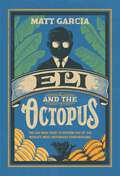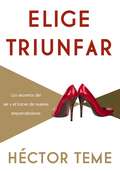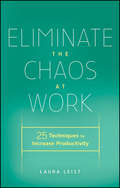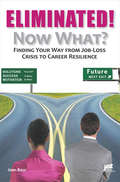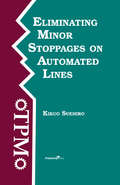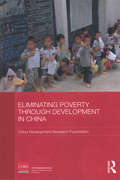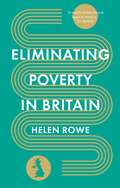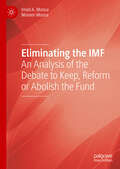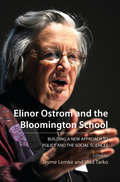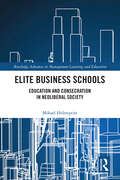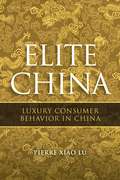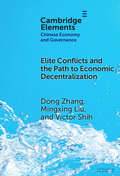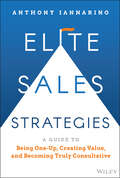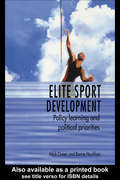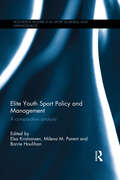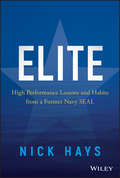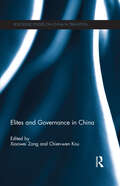- Table View
- List View
Eli Lilly: The Evista Project
by Steven C. Wheelwright Matthew C. VerlindenDescribes the creation and operation of the initial two heavyweight teams for new drug development and launch. The primary focus is on one of the teams, Evista, although comparisons to the other team, Zyprexa, are included. Lilly must decide the next phase (postlaunch) for managing Evista's rollout.
Eli and the Octopus: The CEO Who Tried to Reform One of the World’s Most Notorious Corporations
by Matt GarciaThe poignant rise and fall of an idealistic immigrant who, as CEO of a major conglomerate, tried to change the way America did business before he himself was swallowed up by corporate corruption.At 8 a.m. on February 3, 1975, Eli Black leapt to his death from the 44th floor of Manhattan’s Pan Am building. The immigrant-turned-CEO of United Brands—formerly United Fruit, now Chiquita—Black seemed an embodiment of the American dream. United Brands was transformed under his leadership—from the “octopus,” a nickname that captured the corrupt power the company had held over Latin American governments, to “the most socially conscious company in the hemisphere,” according to a well-placed commentator. How did it all go wrong?Eli and the Octopus traces the rise and fall of an enigmatic business leader and his influence on the nascent project of corporate social responsibility. Born Menashe Elihu Blachowitz in Lublin, Poland, Black arrived in New York at the age of three and became a rabbi before entering the business world. Driven by the moral tenets of his faith, he charted a new course in industries known for poor treatment of workers, partnering with labor leaders like Cesar Chavez to improve conditions. But risky investments, economic recession, and a costly wave of natural disasters led Black away from the path of reform and toward corrupt backroom dealing.Now, two decades after Google’s embrace of “Don’t be evil” as its unofficial motto, debates about “ethical capitalism” are more heated than ever. Matt Garcia presents an unvarnished portrait of Black’s complicated legacy. Exploring the limits of corporate social responsibility on American life, Eli and the Octopus offers pointed lessons for those who hope to do good while doing business.
Elia Nuqul and the Making of a Middle Eastern Business Group (A)
by Geoffrey G. Jones Lana GhanemThe case is concerned with Elia Nuqul, the founder of Jordanian-based Nuqul Brothers, a large diversified business group. It shows how Nuqul, a Christian Palestinian whose family was forced to flee to Jordan after the creation of Israel in 1948, built a business in his new home, first in trading and later in consumer products such as hygienic paper mnaufacturing. The case shows the challenges of building such an entrepreneurial business in a developing region with high political instability. The case is positioned within the wider context of the regional conflict in Palestine and Israel, and it provides a vehicle for exploring the role and responsibility of entrepreneurs, if any, in such conflicts.
Elige triunfar: Los secretos del ser y el hacer de mujeres emprendedoras
by Héctor TemeNuestro mundo actual se distingue por la emancipación femenina. La mujer emprendedora entiende que la relación de esclavitud ya no se acepta y que la relación de dependencia no satisface; sin embargo, la relación de independencia no sirve. No obstante hay nuevos modelos para llegar a ser triunfadoras, lo cual es posible en una relación de interdependencia. Moviéndose juntas, viéndose crecer unas a otras, ayudándose más y más cada día. Disfrutando el éxito de la otra como propio, mientras se persiste en lograr el particular.* ¿Quieres ser una mujer triunfadora y todavía no lo logras?* ¿Te gusta lo que haces pero deseas hacerlo menos tiempo y sacarle el máximo provecho?* ¿Estás a punto de pasar al siguiente nivel, comprar tu casa, ganarte el bono máximo y necesitas herramientas?* ¿Trabajas mucho y ganas bien, pero no lo disfrutas?* ¿Has tenido que empezar de nuevo muchas veces?* ¿Te cuesta saber exactamente cómo hacerlo?Si la respuesta ha sido sí, entonces este libro es para ti.
Eliminate the Chaos at Work
by Laura LeistCreate office efficiency and business productivity with this helpful book. Eliminate the Chaos at Work increases your business productivity and peace of mind by showing you how to create streamlined information systems, processes and workflows. Laura's proven 25 techniques are easy to implement, realistic and results oriented. Using these techniques, you can take control over your time and information to create workable systems built to reflect how you think and process information. Eliminate the Chaos at Work breaks down the everyday organization and productivity challenges you face at work into four areas: time, paper and information management as well as managing all of the stuff in your office. You'll learn effective time and information management techniques including how to: Produce logical, user friendly information management systems to ensure information is organized and easily retrievable Schedule and manage meetings that aren't total time wasters Implement a system to process and follow up on e-mail Create an organized e-mail filing structure for easy retrieval De-clutter paper files, decide what can be stored, scanned, shredded or recycled Learn what paper management system will work best for you and how to create the filing structure Use the PAPERS method for maintaining efficient paper management systems Determine which task management system is right for your needs and how to manage your tasks and projects daily using the 20-minute rule Use the 10-step process to organize the stuff in your office Imagine working in an office where you feel in control and on top of things, instead of overwhelmed. Setup a comfortable workspace and make yourself and your team's office more productive, supported and in control with Eliminate the Chaos at Work.
Eliminated! Now What?
by Jean BaurTeaches you how to view your job loss as an opportunity, rather than a crippling dilemma.
Eliminating Minor Stoppages on Automated Lines
by Kikuo SuehiroStoppages of automated equipment lines adversely affect productivity, cost, and lead time. Such losses make decreasing the number of stoppages a crucial element of TPM. Kikuo Suehiro has helped companies such as Hitachi achieve unprecedented reduction in the number of minor stoppages. In this explicitly detailed book, he presents a scientific approach to determining the causes of stoppages and the actions that can be taken to diminish their occurrence.
Eliminating Poverty Through Development in China (Routledge Studies on the Chinese Economy)
by China Development Research FoundationIn recent years China has achieved impressive economic growth, and also made remarkable progress in human development. However, contemporary China is still faced with the great challenge of widespread poverty. This not only constitutes a barrier against China’s pursuit of sustainable economic growth, but also poses a potential threat to China’s attempts to construct a harmonious society in the future. This book, written by three renowned poverty-reduction experts under the aegis of the China Development Research Foundation - one of China’s leading think-tanks - and drawing on the research of over twenty of China’s top scholars in this field, examines China’s efforts to eliminate poverty through development. It analyses all of the key issues, providing a review of China’s past record in poverty alleviation, comparing this with the experiences of other countries, identifying the new characteristics and trends in poverty in recent years, and discussing the factors responsible. It assesses the objectives and success of the poverty alleviation policies adopted by the Chinese government in a comprehensive way, and puts forward suggestions for policy makers. Overall, this book is a valuable account of China’s own thinking on its problems of poverty, and the best ways to tackle it and achieve sustainable economic development.
Eliminating Poverty in Britain
by Helen RoweCan we really end poverty in Britain?Yes, we can.In this groundbreaking book, Helen Rowe brings together the latest research with stories from across Britain to show us that ending poverty in the twenty-first century is possible. She describes the effects of deprivation on our society, institutions, communities, families and individuals – down to their very DNA.By using a combination of compassion, focus and a plan, Rowe describes how we can end poverty in five years, without raising taxes. Her radical ideas are grounded in practical realities, as she reveals how ordinary processes can yield extraordinary results.This book has huge ramifications for Britain and every developed nation globally. It will force governments to face an issue that has been ignored for too long. After Covid-19, Brexit, war, austerity and the global financial crash, Britain deserves a more positive future. How do we create it? Eliminating Poverty in Britain has the answers.
Eliminating the IMF: An Analysis of the Debate to Keep, Reform or Abolish the Fund
by Imad A. Moosa Nisreen MoosaThis book offers a concise but thorough analysis of the International Monetary Fund reform debate. Since the advent of the Asian financial crisis in the late 1990s, a lengthy deliberation has ensued over whether the IMF should be reformed, abolished, or left as is. The authors approach this debate from a normative perspective while looking at arguments from all sides, as well as reflecting on the history, functions, and ideology of the IMF. This unique approach gives weight to the authors’ perspectives and their conclusion that the IMF ultimately does more harm than good. Written to analyze and contribute to the current IMF debate, this Palgrave Pivot is a must-read for scholars and policymakers invested in the conversation surrounding IMF reform.
Elimination Round: Screening Opportunities--Surfacing the Most Promising Innovation Opportunities
by Christian Terwiesch Karl T. UlrichOpportunity screening is the first step in the selection process that aims to identify exceptional innovation opportunities from the pool of opportunities you have collected. It's the qualification phase of the innovation tournament. According to the authors, an effective screening process must be efficient and accurate. This chapter outlines a three-round process for evaluating innovation opportunities to arrive at the most promising. This chapter was originally published as chapter 4 of "Innovation Tournaments: Creating and Selecting Exceptional Opportunities."
Elinor Ostrom and the Bloomington School: Building a New Approach to Policy and the Social Sciences
by Jayme Lemke and Vlad TarkoElinor Ostrom was the first female winner of the Nobel Prize in economics, and her achievement has generated renewed interest in the Bloomington School research program in institutional economics and political economy. These essays showcase Ostrom's extensive and lasting influence throughout economics and the wider social sciences. Contributors contextualize the Bloomington School within schools of economic thought and show how Ostrom's distinct methodology has been used in policy-making and governance. Case studies illustrate the value of civic involvement within public policy, a method pioneered by Ostrom and the Bloomington School. Elinor Ostrom and the Bloomington School provides a valuable resource for those keen to understand Ostrom's approach, especially when applied to policy-making and wider use in the social sciences. Readers new to the Bloomington School will be introduced to its central areas of research while those already familiar with the school will appreciate its subtle connections to other disciplines and research agendas.
Eliot Spitzer: Pushing Wall Street to Reform
by Jonathan Schlefer Rawi Abdelal Rafael Di TellaNew York State Attorney General Eliot Spitzer faced a decision about how to stop wrongdoing committed by major Wall Street firms during the Internet boom. The equities analysts of Merrill Lynch and other Wall Street firms were charged with objectively advising retail investors whether to buy or sell publicly traded stock. The analysts had rated some stock a strong buy, while at the same time disparaging it in Internet emails as "a piece of junk" or a "powder keg." Spitzer concluded that the analysts sometimes issued such buy ratings on stock of companies because of a conflict of interest: the Wall Street firms the analysts worked for were making handsome fees for underwriting the companies' stock offerings and providing other services. The usual procedure when an enforcement agency such as the Federal Securities and Exchange Commission (SEC) discovered such a situation would be to complete its investigation and negotiate a resolution privately with the financial firm. If it could not resolve the matter, the agency would formally file suit against the firm in court. This option was open to Spitzer, but the 1921 New York statue gave him an alternative. Even before filing suit in court--and while continuing to investigate the firm further--he could broadcast his findings to warn the public and brand the firm with wrongdoing. This case investigates the decision Spitzer made, and its long-term implications for U.S. financial regulation and financial industries.
Elite Business Schools: Education and Consecration in Neoliberal Society (Routledge Advances in Management Learning and Education)
by Mikael HolmqvistSocial scientists are paying increasing attention to the business and financial elites: There’s a great need to understand who these elites are, what they do, and what makes them tick, as individuals but also as a class. By examining elite business schools, the institutions that train and prepare people to assume important leadership and decision-making positions in business, finance and related sectors, we may also learn how the economic elites are made. A key argument in this book is that elite schools are known to create powerful groups in society, offering them the intellectual and analytical means to act as leaders, but, most importantly, the social, moral and aesthetic skills that are deemed necessary to exercise power; in all essential respects elite schools consecrate people. By dominating much of higher education today, and by doing so in a way that creates and reproduces a market-based organization and control of society, elite business schools represent certain interests and ideologies that affect the lives of most people. In understanding how the modern economy is run, elite business schools, therefore, represent critical study objects. This book, based on an in-depth study of the Stockholm School of Economics (SSE), offers a sociological analysis of the world of elite business schools. Specifically, this book examines the consecration of SSE’s students from a number of perspectives and in a number of situations, focusing on student union activities, school culture, faculty behavior, teaching, courses and alumni events, noting the symbolic importance of economics and particularly the school’s unique relation among the world’s business schools to the Nobel Prize. The book addresses the topics with regards to the sociology of elites, management education and organizational studies and will be of interest to researchers, academics, and students also interested in business history, higher education studies, and sociology of education.
Elite China
by Pierre Xiao LuA ground-breaking exploration of the Chinese elite's consumption of luxury products and their attitudes toward luxury goods. Elite China identifies the Chinese luxury product consumers and the characteristics of their luxury consumption, explains the implications for luxury firms and marketers and most importantly, spells out strategies for international luxury brands and Chinese luxury brands to succeed in Chinese market.
Elite Conflicts and the Path to Economic Decentralization (Elements in Chinese Economy and Governance)
by Dong Zhang Mingxing Liu Victor ShihWhy would a politically centralized state embark on the path of economic decentralization? This Element delves into the political origin of the puzzling economic decentralization in mainland China. The authors contend that the intra-elite conflicts between the authoritarian ruler and the ruling elites within the state prompted the ruler to pursue decentralization as a strategy to curb the influence wielded by the ruling elites. By examining the composition of the Chinese Communist Party's Central Committee, they find that the Cultural Revolution, fueled by elite conflicts, shifted the elite selectorate's composition from favoring central agencies to favoring local interests. Subsequent low turnover reinforced this shift, aligning elite incentives with decentralization policies and committing the Chinese leadership to a decentralized path in the 1980s. Additionally, Taiwan's economic liberalization under the Kuomintang's authoritarian rule provides further evidence of the link between ruling party elite composition and economic policy orientation.
Elite Sales Strategies: A Guide to Being One-Up, Creating Value, and Becoming Truly Consultative
by Anthony IannarinoAccelerate your sales career with this how-to book from an expert in sales In Elite Sales Strategies, expert sales leader Anthony Iannarino offers his philosophy about becoming a commercial success. This guidebook provides unique insights into how to approach every sale by serving your clients from a position of authority and expertise. As Iannarino himself notes, this technique speaks to an ethical obligation towards your client, combining ethics and tactics to help place you in a position where your strengths can be fully utilized. This guidebook suggests putting yourself in a “one-up” position, where you, as the salesperson, come to a client in a position of authority and strength, where you yourself are qualified to offer nuanced and helpful advice to companies that have put themselves in a “one-down” position, whether that be by bad decision-making, poor understanding of the marketplace, or bad luck. At its heart, this book suggests you find the advantages that you can provide that will, in turn, help your client become “one-up” themselves in their own field and ensure they achieve the better results they need. In addition, Elite Sales Strategies provides readers with: A step-by-step approach for how to become “one-up” yourself and what you provide to your clients A healthy analysis of what makes a person or a company “one-down” and tips on how to course correct Strategies, tactics, and talk tracks that will provide you with what you need to become “one-up” Terminology and vocabulary so that you can approach your client with tact and decorum while still addressing the weaknesses of their system As a successful international speaker, author, and sales leader, Anthony Iannarino brings a unique set of skills to bear in this book. Iannarino's tried-and-true methodology is an ideal resource for sales professionals in all fields, as well as for executives and managers looking to improve their sales success and position within the business world.
Elite Sport Development: Policy Learning and Political Priorities
by Barrie Houlihan Mick GreenElite Sport Development addresses important sport policy questions and explores the emergence, development and current status of elite sport development policy with detailed examination of Australia, Canada and the UK. The sports compared are swimming, track and field athletics, and sailing. The book looks at the problems faced in establishing an elite sport development infrastructure covering facilities, coaching, sports science and competition. Likewise, full-time athletes are considered and the tensions that a pre-occupation with elite achievement generates within the sports is also examined. Includes: * why governments invest heavily in elite sport* the relationship between Government and NGB's* the impact of elite investment on 'sport for all' * the selection of individual sports for priority funding. This detailed text will be of interest to students, researchers and professionals working in sports development and policy.
Elite Youth Sport Policy and Management: A comparative analysis (Routledge Research in Sport Business and Management)
by Barrie Houlihan Milena M. Parent Elsa KristiansenElite youth sport competitions have increased significantly in number in recent years, with the Youth Olympic Games representing the high point of this phenomenon. This book examines the global context within which elite youth sport has emerged and continues to grow. It explores elite youth sport policy across fifteen countries, in Europe, the Americas, Africa and Asia, addressing the questions of how youth talent development is organised and why elite youth sport has become so popular. Taking a comparative global perspective, the book analyses the growth in more systematic approaches to young athlete development and the increasing emphasis on early talent identification. It discusses the attitude of stakeholders (such as NGBs, governments and sponsors) towards elite youth sport, while also considering how young elite athletes’ interests are protected and how the growth in elite youth sport affects a sport’s development strategy. Written by a team of internationally renowned researchers, Elite Youth Sport Policy and Management: A comparative analysis is fascinating reading for all students, scholars, managers, policy-makers and coaches with an interest in youth sport, elite sport development, talent identification and sports policy.
Elite: High Performance Lessons and Habits from a Former Navy SEAL
by Nick HaysProven tools to take your team and yourself to the next level Elite: High Performance Lessons and Habits from a Former Navy SEAL is a practical, no-nonsense guide to elevate your leadership skills and drive your team to their maximum potential. Before you can push your team to the max, you must push yourself—elite teams require elite leaders. This invaluable guide supplies the tools you need to develop effective strategies to motivate, adapt, and overcome. Author Nick Hays combines military training with Harvard education to present a comprehensive program that will unlock the potential in yourself and your team. The business environment has changed dramatically over the last several decades. Volatile market conditions, disruptive innovation, and digital transformations across entire sectors have rendered traditional business methods obsolete. To thrive, businesses must be adaptable, agile, and lean. Policies and procedures may change, but strong leadership and shared goals ensure a source of strength and continuity. Providing real-world methods and effective strategies, this essential resource will allow you to: Embrace the Warrior Mindset to always be proactive, never a victim Develop the trust of your team through strength and shared experience Devise durable and sustainable business strategies and contingency plans that adapt to fluid situations Promote a culture of innovation and authenticity to deliver a solid foundation for your team Elite: High Performance Lessons and Habits from a Former Navy SEAL is a must-read guide for everyone from aspiring entrepreneurs to established business leaders. No matter the stage of your business—development, exploitation, or disruption—Elite will change your approach to business and unlock the warrior within.
Elites and Governance in China: Governance And Elites In China (Routledge Studies on China in Transition)
by Xiaowei Zang Chien-Wen KouThis book reveals the complex relationship between elite perceptions and behaviour, and governance, in China. It moves away from existing scholarship by focusing on functionaries, grass-roots elites, leading intellectuals, and opinion-makers in China and by looking beyond the top leadership, makes a significant contribution to our understanding of shared governance and broadened political participation in China. The chapters in this collection explore the elites’ role as opinion-makers, technical experts, producers of knowledge, and executives or managers, and pose a number of questions, the answers to which are crucial to understanding future political and economic development in China. What are elite perceptions of governance, inequality and justice; what do the elites mean by good governance; what is the influence of non-Chinese Communist Party elites in policy-making and implementation in China; how have they exerted their influence in the PRC and influenced its direction of future development; and what have grass-roots elites contributed to governance in local communities? Providing a keen insight into the role elites have played in governing China since 1978, this book is a pioneering effort to bring together elite studies and governance studies. As such, it will be highly relevant for policy-makers within international organizations, governments, and NGOs outside China as well as appealing to scholars and students interested in Chinese politics and governance.
Elizabeth Best (A)
by C. Wickham Skinner Ardis BurstNew political appointee with years of volunteer experience takes over highly responsible job in state government and is met with bureaucratic resistance.
Elizabeth Best (B)
by C. Wickham Skinner Ardis BurstDescribes what a new political appointee with years of volunteer experience did in office.
Elizabeth Best (C)
by C. Wickham Skinner Ardis BurstDiscusses a problem that confronted the appointee later--how to get a large, complex job accomplished without evident resources.
Elizabeth Best (D)
by C. Wickham Skinner Ardis BurstDescribes how and what she did to accomplish the job.

